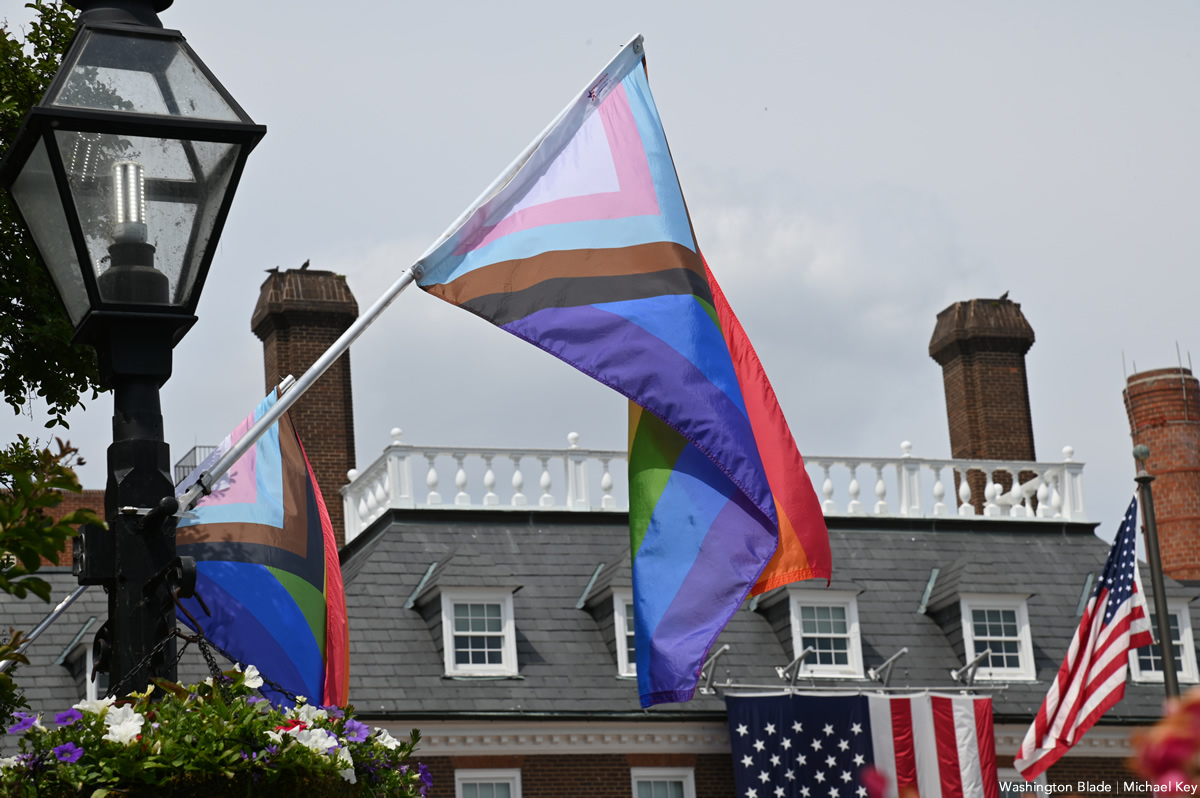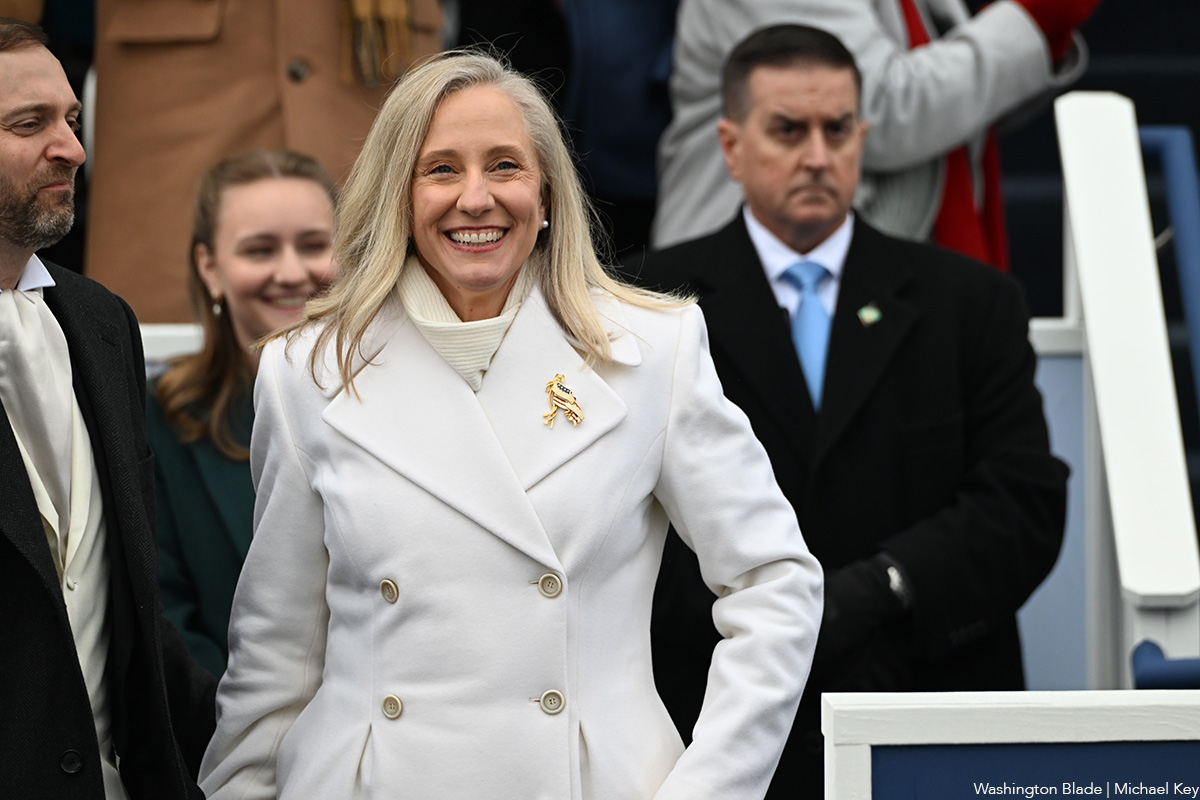Virginia
Alexandria City Council approves ‘LGBTQ+/Trans Sanctuary Resolution’
Measure drafted by advocacy group, introduced by gay Council member

The Alexandria, Va., City Council on Sept. 24 voted unanimously to approve an “LGBTQ+/Trans Sanctuary Resolution” that, among other things, calls on the city attorney and city manager to take administrative or legal action to oppose anti-LGBTQ policies or laws proposed or enacted on the national, state, or local levels.
The resolution was introduced by gay Council member Kirk McPike and drafted by an organization called the Metro D.C. Democratic Socialists of America (DSA) Trans Rights & Bodily Autonomy Campaign.
“We reaffirm our commitment to equal protection and freedom from discrimination on the basis of sex, including our commitment to ensuring LGBTQ+ individuals are free from discrimination, whether by individuals, businesses, or government actors,” the resolution states.
“We call upon the other elected leaders of Alexandria to use the legislative and administrative authority available to them to take such actions as may be necessary to protect LGBTQ+ individuals from discrimination on the basis of sex due to their sexual orientation or gender identity and to enshrine such protections into law,” the resolution continues.
It concludes by stating, “We ask the City Attorney to actively seek participation, as a plaintiff or amicus curiae, in ongoing or future litigation to protect the rights of LGBTQ individuals.”
In 2020 the Virginia General Assembly passed and then Gov. Ralph Northam (D) signed legislation banning discrimination based on sexual orientation and gender identity. The city of Alexandria and other Virginia jurisdictions, including Arlington, have passed similar LGBTQ nondiscrimination laws.
Lyra McMillan, a spokesperson for the Metro D.C. DSA Trans Rights & Bodily Autonomy Campaign, said the LGBTQ+/Trans Sanctuary Resolution is intended to strengthen and protect the state’s and Alexandria’s LGBTQ rights laws by defending them against attempts to overturn or weaken them from ongoing efforts by anti-LGBTQ lawmakers in Congress and other states.
McMillan points to efforts by Virginia’s current governor, Glenn Youngkin (R), to curtail LGBTQ rights, especially trans rights, in the state’s public schools.
“In the face of this sort of backlash, places like Alexandria need to stand up and push back,” McPike told ALX Now, an online Alexandria news publication.
The only visible opposition to the resolution came from the Catholic Diocese of Arlington, which released a statement calling on the community to ask the Council not to pass it.
“This resolution would assert the authority of the City Manager to independently interpret the U.S. Constitution, direct city officials to use public funds to engage in future federal litigation, and encourage transgender surgical interventions, including for minors,” the statement says
McMillan said the resolution had widespread support in the community.
“I’m proud of the work we’ve done together with the City Council to help protect and reassure our LGBTQ+ comrades of their safety, respect, and liberty when living, visiting, and traveling through the city,” she said in a statement.
Virginia
Va. lawmakers consider partial restoration of Ryan White funds
State Department of Health in 2025 cut $20 million from Part B program

The Virginia General Assembly is considering the partial restoration of HIV funding that the state’s Department of Health cut last year.
The Department of Health in 2025 cut $20 million — or 67 percent of total funding — from the Ryan White Part B program.
The funding cuts started with the Trump-Vance administration passing budget cuts to federal HIV screening and protection programs. Rebate issues between the Virginia Department of Health and the company that provides HIV medications began.
Advocates say the funding cuts have disproportionately impacted lower-income people.
The Ryan White HIV/AIDS Program, a federal program started in 1990, provides medical services, public education, and essential services. Part B offers 21 services, seven of which remained funded after the budget cuts.
Equality Virginia notes “in 2025, a 67 percent reduction severely destabilized HIV services across the commonwealth.”
Virginia lawmakers have approved two bills — House Bill 30 and Senate Bill 30 — that would partially restore the funding. The Ryan White cuts remain a concern among community members.
Both chambers of the General Assembly must review their proposed changes before lawmakers can adopt the bills.
“While these amendments aren’t a full restoration of what community-based organizations lost, this marks a critical step toward stabilizing care for thousands of Virginians living with HIV,” said Equality Virginia Executive Director Narissa Rahaman. “Equality Virginia plans to continue their contact with lawmakers and delegates through the conference and up until the passing of the budget.”
“We appreciate lawmakers from both sides of the aisle who recognized the urgency of this moment and will work to ensure funding remains in the final version signed by the governor,” added Rahaman.
Virginia
Arlington LGBTQ bar Freddie’s celebrates 25th anniversary
Owner asks public to support D.C.-area gay bars

An overflowing crowd turned out Sunday night, March 1, for the 25th anniversary celebration of Freddie’s Beach Bar, the LGBTQ bar and restaurant located in the Crystal City section of Arlington, Va.
The celebration began as longtime patrons sitting at tables and at the bar ordered drinks, snacks, and full meals as several of Freddie’s well-known drag queens performed on a decorated stage.
Roland Watkins, an official with Equality NoVa, an LGBTQ advocacy organization based in the Northern Virginia areas of Arlington, Alexandria, and Fairfax County, next told the gathering about the history of Freddie’s Beach Bar and the role he said that owner Freddie Lutz has played in broadening the bar’s role into a community gathering place.
“Twenty-five years ago, opening a gay bar in Arlington was not a given,” Watkins told the crowd from the stage. “It took courage, convincing, and a deep belief that our community belongs openly, visibly, and proudly,” he said. “And that belief came from Freddie.”
Watkins and others familiar with Freddie’s noted that under Lutz’s leadership and support from his staff, Freddie’s provided support and a gathering place for LGBTQ organizations and a place where Virginia elected officials, and candidates running for public office, came to express their support for the LGBTQ community.
“Over the past 25 years, Freddie’s has become more than a bar,” Watkins said. “It has become a community maker.”
Lutz, who spoke next, said he was moved by the outpouring of support from long-time customers. “Thank you all so much for coming tonight and thank you all so much for your support over the past 25 years,” he said. “I can’t tell you how much that means to me and how much it’s kept me going.”
But Lutz then said Freddie’s, like many other D.C. area gay bars, continues to face economic hard times that he said began during the COVID pandemic. He noted that fewer customers are coming to Freddie’s in recent years, with a significant drop in patronage for his once lucrative weekend buffet brunches.
“So, I don’t want to be the daddy downer on my 25-year anniversary,” he said. “But this was actually the worst year we’ve ever had,” he added. “And I guess what I’m asking is please help us out. Not just me, but all the gay bars in the area.” He added, “I’m reaching out and I’m appealing to you not to forget the gay bars.”
Lutz received loud, prolonged applause, with many customers hugging him as he walked off the stage.
Virginia
Va. activists preparing campaign in support of repealing marriage amendment
Referendum about ‘dignity and equal protection under the law’

Virginia voters in November will vote on whether to repeal their state’s constitutional amendment that defines marriage as between a man and a woman.
Democratic Gov. Abigail Spanberger on Feb. 6 signed House Bill 612 into law. It facilitates a referendum for voters to approve the repeal of the 2006 Marshall-Newman Amendment. Although the U.S. Supreme Court’s Obergefell ruling extended marriage rights to same-sex couples across the country in 2014, codifying marriage equality in Virginia’s constitution would protect it in the state in case the decision is overturned.
Maryland voters in 2012 approved Question 6, which upheld the state’s marriage equality law, by a 52-48 percent margin. Same-sex marriage became legal in Maryland on Jan. 1, 2013.
LGBTQ advocacy groups and organizations that oppose marriage equality mounted political campaigns ahead of the referendum.

Equality Virginia has been involved in advancing LGBTQ rights in Virginia since 1989.
Equality Virginia is working under its 501c3 designation in conjunction with Equality Virginia Advocates, which operates under a 501c4 designation, to plan campaigns in support of repealing the Marshall-Newman Amendment.
The two main campaigns on which Equality Virginia will be focused are education and voter mobilization. Reed Williams, the group’s director of digital engagement and narrative, spoke with the Washington Blade about Equality Virginia’s plans ahead of the referendum.
Williams said an organization for a “statewide public education campaign” is currently underway. Williams told the Blade its goal will be “to ensure voters understand what this amendment does and why updating Virginia’s constitution matters for families across the commonwealth.”
The organization is also working on a “robust media and voter mobilization campaign to identify and turn out voters” to repeal Marshall-Newman Amendment. Equality Virginia plans to work with the community members to guarantee voters are getting clear and accurate information regarding the meaning of this vote and its effect on the Virginia LGBTQ community.
“We believe Virginia voters are ready to bring our constitution in line with both the law and the values of fairness and freedom that define our commonwealth,” said Equality Virginia Executive Director Narissa Rahaman. “This referendum is about ensuring loving, committed couples and their families are treated with dignity and equal protection under the law.”
The Human Rights Campaign has also worked closely with Equality Virginia.
“It’s time to get rid of outdated, unconstitutional language and ensure that same sex couples are protected in Virginia,” HRC President Kelley Robinson told the Blade in a statement.
















